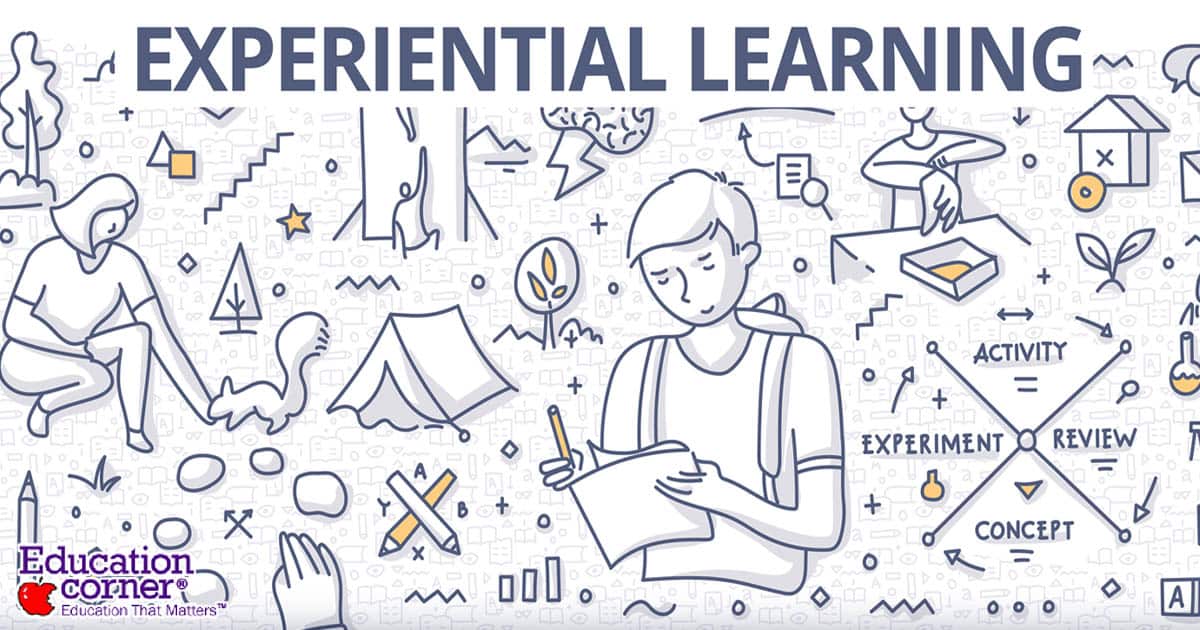Experiential learning is a learning process where students learn through their experiences (BU Center for Teaching & Learning, n.d.). They learn by doing something, and then later reflecting on and analyzing their experience. This learning process prompts students to explore their curiosities, make decisions, and learn from their mistakes.
Below is a video that further explains experiential learning.
An important aspect of experiential learning is Kolb’s learning cycle. The cycle depicts 4 processes: experiencing, reflecting, thinking, and acting. Firstly, experiencing or concrete experience is the situation or experience that initially triggers the learning. (McLeod, 2013). The experience is one of the most important aspects of experiential learning, as it is what prompts reflection, analysis and experimentation. The initial experience is where the student will be doing whatever it is that they are learning about. Secondly, reflecting, or reflective observation, is the process of reflecting on and observing what happened during their experience, and relating it to past experiences and knowledge (McLeod, 2013). The process of thinking, which is also known as abstract conceptualization, is when a new idea or concept stems from their learning. This is when the observations that were made are analyzed (McLeod, 2013). Finally, acting, which is also referred to as active experimentation, is the process of testing ideas that stemmed from the analysis (BU Center for Teaching & Learning, n.d.). This is the process that will lead to new experiences, which will restart the cycle.

There are also various learning styles, which are used in conjunction with the learning cycle. More on learning styles can be found at https://experientiallearninginstitute.org/resources/what-is-experiential-learning/
I believe that this learning process doesn’t align fully with the topic that my pod has chosen for our interactive learning resource. Our topic is stress, and our resource is intended for elementary students. Experiential learning is a process that is more prevalent when learning skills and life lessons and is used less when teaching in a classroom about concrete subjects. While experiential learning is very important when it comes to learning about stress naturally, it is not useful in a classroom setting. There isn’t an experience involving stress that we could integrate into our lesson that would be beneficial for the learners.

Everyone uses experiential learning when developing new skills and learning life lessons. There are many things that everyone needs to learn which are only possible through experiential learning. Examples range from learning how to survive on one’s own after moving out, to learning how to walk as an infant. Experiential learning is vital for growth, as we all learn from our experiences and apply our learning to our day-to-day lives.
References
BU Center for Teaching & Learning. (n.d.) Experiential learning. Retrieved May 25, 2022, from https://www.bu.edu/ctl/guides/experiential-learning/
ELBS. (2020, May 15). This is Experiential Learning [Video]. Youtube.
McLeod, S. (2013). Kolb’s learning styles and experiential learning cycle. Simply Psychology. https://www.simplypsychology.org/learning-kolb.html
Hi there!
I love the images and the video you have included in your blog post on experiential learning! I understand that experiential learning is the process where students learn through their experiences. However, I wondered if learning from our past experiences still qualifies as experiential learning? If it does, then experiential learning could still work for our interactive learning resource! We could ask students to think back to situations when they were stressed and then help them connect those memories to the knowledge they are currently learning. Just food for thought! Let me know what you think 🙂